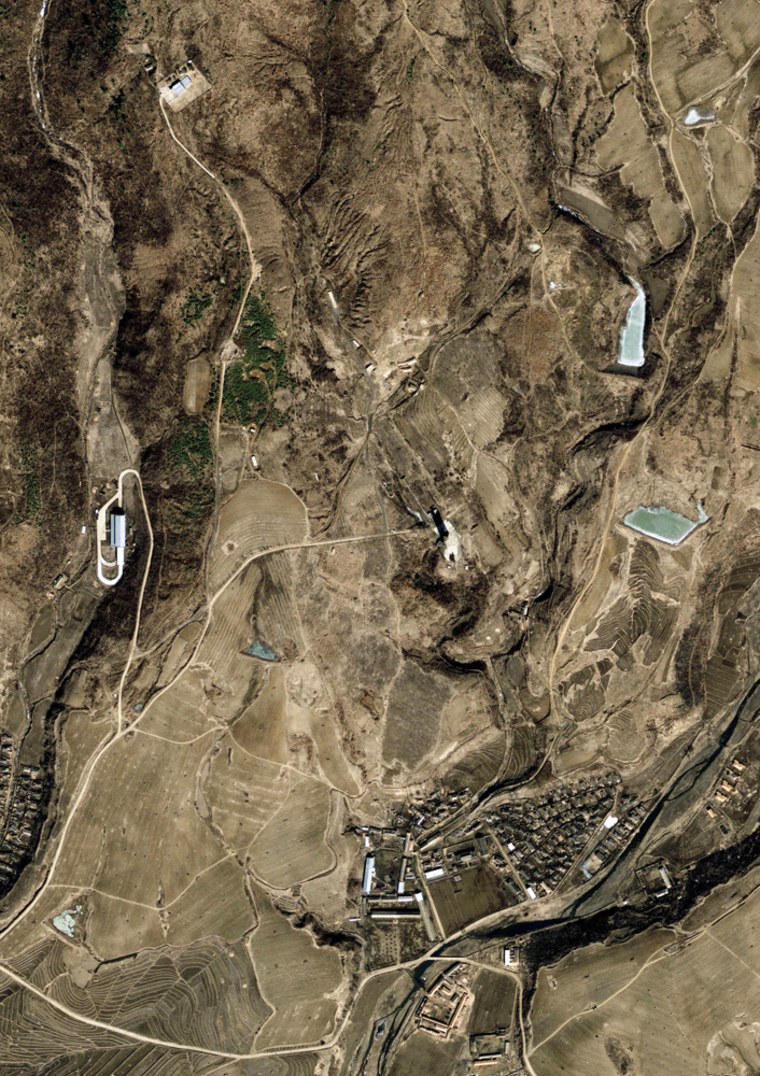U.S. military officials confirmed Thursday that North Korea has filed an official notice that it intends to conduct a missile launch early next month.
North Korea claims the purpose is to launch a satellite into space, but the Director of National Intelligence Dennis Blair told a congressional hearing this week that if the launch is successful it would mean for that for the first time North Korea would have the capability to launch a ballistic missile that could reach the continental United States.
Today's "Notice to Airmen and Mariners" (NOTAM) is the first indication of the timing of the North Korean launch.
Based on intelligence, U.S. officials have estimated the launch was at least "several weeks away." The North Korean notice indicated a launch between April 4-8.
The missile itself has not yet been moved to the launch pad and is still "under wraps" inside an assembly facility, out of sight of U.S. spy satellites, officials said. Once it's moved to the pad it's estimated it would take about a week to fuel and prepare for launch. The North Koreans could accelerate that process, but U.S. officials don't see that happening given today's NOTAM.
Past failures
The last North Korean missile test of a Taepodong-2 two-stage missile in 2006 was a spectacular failure when the missile started to cartwheel out of control shortly after it left the launch pad and was either destroyed by ground controllers or simply flew apart.
In February, Defense Secretary Robert Gates appeared to joke about North Korea's missile capabilities and range when he said, "So far, it's very short." An earlier launch of a Taepodong-1 surprised the U.S. and its allies when it flew directly over Japan before falling harmlessly into the Pacific. U.S. intelligence officials also considered that test a failure.
U.S. military and intelligence agencies will closely monitor the launch with satellites and sophisticated intercept radar to gather whatever information they can about North Korea's capabilities. Military officials say the United States will be prepared to try to shoot down the missile if it becomes a threat, intentional or otherwise, to any U.S. territories or its allies in the region.
South Korean reports
South Korea's Yonhap news agency reported Thursday that North Korea has informed the International Maritime Organization of its early April schedule, while the North's official Korean Central News Agency said the country has informed the International Civil Aviation Organization, International Maritime Organization and others "of necessary information for the safe navigation of planes and ships" amid preparations for the launch.
Reports began emerging in February that North Korea was preparing to test a long-range missile. North Korea has since sought to portray the launch as a legitimate and peaceful space program, and has vowed to retaliate against anyone who tries to prevent it.
South Korea, Japan and the United States believe the launch will test missile technology in violation of a 2006 U.N. Security Council resolution banning Pyongyang from ballistic activity, and have urged the North not to go forward.
North Korea's rocket plans have stoked already tense relations with the United States and South Korea. Pyongyang accuses them of using preparing an invasion during annual military drills taking place this week, a charge they deny.
South Korea's two main airlines began redirecting flights away from the North's airspace last week after the North threatened Seoul's passenger planes in protest over the annual exercises.
North Korea's military cut off a hot line with South Korea and temporarily closed the border this week before reopening it to allow South Koreans to travel to a joint industrial zone in the North.
In Washington, U.S. Secretary of State Hillary Rodham Clinton said "a range of options" could be taken against North Korea if the country fires a missile.
She said Wednesday that the U.S., South Korea, Russia, Japan and China will discuss a response if the North goes forward with a missile test. The five countries are involved in disarmament talks aimed at ending North Korea's nuclear programs.
More on North Korea
